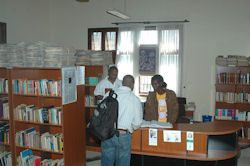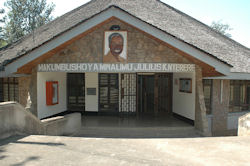

Nyerere brought these various elements together in the African context, reasoning
that there could be no justification for social or economic inequities in
Tanzania, given the value placed by traditional African culture on community
and family.
The African extended family cultivated its fields together and shared its
resources in times of need. Could not this communalism be applied at the national
level, thereby avoiding large gaps between rich and poor? Nyerere chose the
term ‘ujamaa’ (family hood) to describe his program,
and to emphasise the blend of eco-
nomic cooperation, racial and tribal
harmony and moralistic self-sacrifice
that he sought to achieve.
Nyerere gained widespread respect for his idealism, for his success in shaping
a society that was politically stable and notably free of tribal rivalries,
and for his contributions towards raising Tanzania’s literacy rate, which
became one of the highest in Africa during his tenure. He also earned international
acclaim for his commitment to pan-Africanism and his regional engagement,
which he continued until his death in October 1999.
Despite criticism of his authoritarian style and economic policies, Nyerere
was indisputably one of

